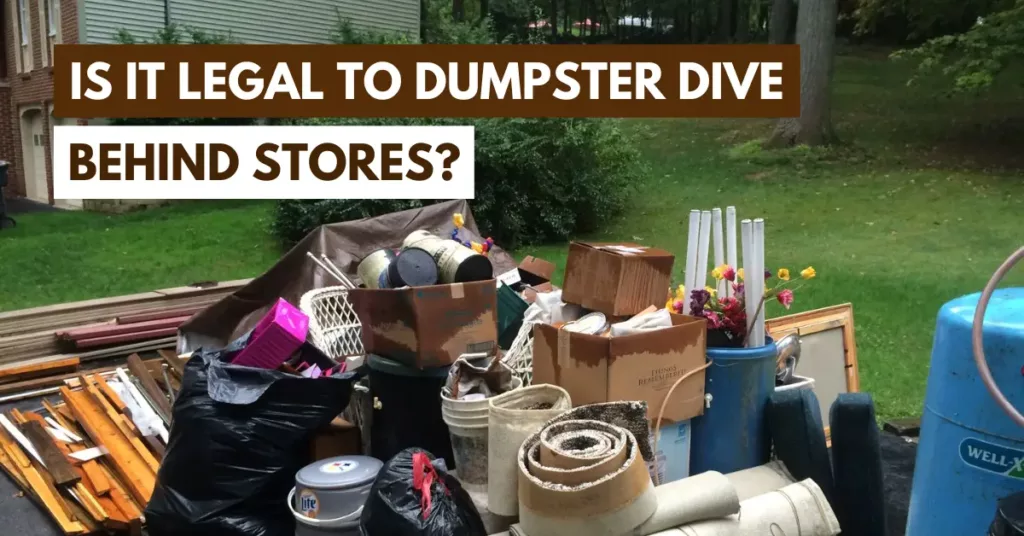Have you ever wondered what riches lie beyond those closed skips as you surveyed the imposing walls of a mall? Or have you experienced the appeal of a cache of abandoned things stashed away from curious customers?
The realm of ‘Dumpster Diving Behind Stores’ is comparable to a hidden subculture where ingenuity and adventure-undiscovered treasures are waiting to await and are prepared to explore the uncharted.
Is it legal to dumpster dive behind stores? We’ll explore the legal world of garbage diving behind shops in this field, the mysteries of what you may discover, the rules that control this unusual activity, and the relevant ethical issues while scavenging in the back alleys of major retailers.
Is Dumpster Diving Allowed Behind Stores?
Is it legal to dumpster dive behind brand name stores? The legality of dumpster diving differs from place to place and can be a complicated legal matter, even though it’s frequently linked to sustainability, recycling, and ingenuity. This extensive guide will examine the legal ramifications of skip-diving behind stores.
1. Local Legal Status Variations
Local rules and ordinances primarily govern it, while state or local legislation may also impact it. What is allowed or limited in one place may be illegal in another. Consequently, learning about and comprehending the local laws is the first step.
2. Trespassing Laws
Trespassing is one of the main issues while trash diving. You can break the law if you enter private property without authorization to access a dumpster or garbage container. Dumpster diving should only be done in public areas or parcels where the owner or management has explicit permission to avoid penalties for trespassing.
3. Rights to Property
Dumpsters and garbage bins are often placed on private land or inside the confines of a building that is either a company or a house. Access to these places is frequently under the authority of property owners or company managers, and anything left in the dumpsters may be considered their property until waste management services formally dispose of it.
4. Adoption Doctrine
The “abandonment doctrine” is a legal theory recognized in some countries. According to this philosophy, goods are deemed abandoned property once they are disposed of in a public skip or garbage can and can be retrieved by anybody. However, there may be differences in how this theory is interpreted and used, and different legal systems may not agree to use it.
5. Good Dumpster Diving Practices
Even if dumpster diving is permitted where you live, adhering to some moral standards is crucial.
i) Keep Away from “No Trespassing” Signs
Never set foot on private property or forbidden zones.
ii) Prevent Making a Mess
Clean the place to the same level or higher than when you found it.
iii) Avoid Causing Damage
Refrain from destroying locks, gates, or containers to access dumpsters.
iv) Stay Up to Date
Be aware of any changes to local legislation that may impact your activity.
6. Legal Issues and Lawsuits
People who engage in skip diving have occasionally run into legal issues. Even when local rules are ambiguous or not enforced, companies or property owners may periodically file a lawsuit if they feel their rights have been infringed.
7. Concerns About Food Safety
When searching for food in dumpsters, take food safety laws into account. Consuming food from dumpsters entails inherent health hazards because the quality of discarded food cannot be guaranteed. The removal of food products from dumpsters may be regulated or prohibited by laws and regulations about food safety.
8. Creating Good Relationships
Dumpster diving is being approached in certain enterprises and organizations more innovatively. They could permit people or nonprofits to gather extra or unsold goods, cut waste, and benefit the neighborhood. Developing trusting relationships with these organizations can open the door to more fruitful and legitimate skip-diving possibilities.
9. Legal Advice
It may be good to speak with a legal expert who can offer advice based on local laws and assist in defending your rights if you need clarification on the legislation surrounding skip diving in your region or face legal issues associated with this activity.
Is it legal to dumpster dive behind stores? Local regulations, property rights, and ethical issues all play a role in the legality of trash diving behind shops. Always study local laws and rules, follow them religiously, get permission when required, and put safety and moral conduct first while skipping diving to ensure you do it legally.
How to Avoid Dumpster Dive Behind Businesses?
It may not be essential for everyone to avoid those who trash dive behind shops because it is often a lawful and ecologically aware practice. Here are some precise actions you may follow, nevertheless, if you would like to discourage divers on your property:
1. Put Up Barriers and Locks
- To limit access, think about locking your garbage cans or dumpsters. Locks ought to be strong enough to discourage recreational divers.
- Put up physical obstacles to prevent unauthorized access to the skip location such as fences or gates.
2. Use of Signs
- Signs saying “No Trespassing” should be displayed near garbage cans or dumpsters. Include details on the potential legal repercussions for trespassers.
- To generate a deterring impact, mention security measures like surveillance cameras on your signs.
3. Regular Inspection
- A staff member or security guard should be assigned to check the trash area, especially after hours frequently.
- If you have security cameras, ensure they include the area where the skip is, and watch the recorded footage as required.
4. Overnight Dumpster Locking
- If your company produces sensitive or private rubbish that others shouldn’t access, consider it during off-peak times.
- Provide keys or access codes appropriately and limit access to just authorized individuals.
5. Work Together with Local Government
- Report any trespassing or unauthorized entry to your property to local police authorities.
- Work with the police to resolve issues and implement local trespassing and property protection laws.
6. Developing Bonds with Charitable Organizations
- Instead of discouraging all divers, think about fostering solid bonds with benevolent institutions in your neighborhood.
- Join forces with nearby NGOs, shelters, or food banks to give extra or unsold products. This proactive strategy can cut waste while helping people in need.
7. Make Use of Secure Containers
- Invest in containers that lock securely to deter unauthorized entry. Some containers include locks that can only be opened by staff members of the trash management department.
8. Employee Education
- Teach your staff to spot and report any unauthorized people trying to enter the skip area.
- Encourage them to put safety first and adhere to established procedures when confronting shady conduct.
9. Uphold Cleanliness
- Keep your dumpsters clean and well-maintained to discourage trash diving. Divers are less likely to be drawn to a skip area that is neat and well-kept.
- To reduce the danger of data breaches, appropriately dispose of sensitive or secret items.
10. Think About Local Laws
- Do local legal and regulation research on property protection and skip diving.
- Make sure that the laws that apply to your security measures are followed.
11. Communication and Collaboration
- Communicate with anybody or anything interested in removing stuff from your dumpsters honestly and courteously.
- You could discover mutually advantageous alternatives like planned pickups or set collection times depending on the situation.
Investigating Dumpster Diving Alternatives Behind Stores
Dumpster diving is rummaging through the trash behind establishments to find useable or recoverable objects. There are other options to consider, even if it might be a sustainable and economical approach to locating things.
1. Online Sharing Communities and Freecycle
Join local Facebook groups or online communities like Freecycle or Nextdoor, where individuals may offer stuff they no longer need for free. These groups encourage reusing and recycling materials in your neighborhood.
2. Secondhand and Thrift Shops
Secondhand markets, consignment shops, and thrift stores are the best places to find reasonably priced, gently worn products. While shopping locally, you may get gadgets, furniture, apparel, and more.
3. Having Garage Sales and Garden Sales
Look for garage sales and yard sales in your neighborhood. These gatherings are troves of gently used goods people are trying to sell for fair rates.
4. Flea Markets and Swap Meets
You may find various used things by visiting swap meetings and flea markets in your neighborhood. You may bargain for pricing, discover unusual goods, and help tiny merchants.
5. Consignment Stores
Acquiring and selling gently worn products at consignment shops is a great idea. Affordable versions of designer apparel, furniture, and accessories are available.
6. Workshops for Repairs and Upcycling
Go to local upcycling or repair classes to learn how to mend and repurpose things. This can increase the usefulness of your stuff while decreasing waste.
7. Collection of Things
Nowadays, several libraries provide ‘Libraries of Things’ where you may rent tools, equipment, and other objects for short periods, avoiding the need to buy or skip diving.
8. Community Bartering
Barter locally with your friends, neighbors, or others in your neighborhood. Without exchanging money, trade goods or services to build community and resourcefulness.
9. Online Shops and Markets
Look for inexpensive, used things on websites like Craigslist, eBay, or Gumtree. When making purchases online, always use care.
10. Local Give-and-Take Occasions
Participate in or host neighborhood give-and-take events where locals may donate stuff they no longer need in exchange for valuable products. These gatherings encourage reuse and sharing.
11. Services for Renting
Consider renting if you seldom use power tools, camping equipment, or party supplies. Rental services for different items are available in several places.
12. Exchanges of books and libraries
Use book exchanges and Little Free Libraries to find free books in your region. Several programs in communities encourage literacy and cut down on book trash.
13. Gardening at Home and Sharing
Create or participate in a community garden in your area. While exchanging resources and gardening expertise with other gardeners, you may cultivate fresh food, herbs, and flowers.
14. Markets for Local Artisans
Visit regional art and craft fairs to purchase locally manufactured things. Finding distinctive, regionally made goods while promoting artisans is possible.
15. Online Economy Sharing Platforms
Use sharing economy websites like Turo for auto rentals, Airbnb for housing, and Tool Libraries for tools. Peer-to-peer sharing is made more accessible by these systems, which also lessens the ownership requirement.
16. Borrow from Family and Friends
Ask your friends and relatives for any temporary necessities they may have, such as kitchenware, children’s supplies, or sports equipment.
17. Mindful Consumption and Minimalism
Become a minimalist and practice mindful consumerism by assessing your requirements and avoiding irrational purchases. This strategy helps you live a life with less waste and clutter.
18. Giving to Charity
Donate everything you don’t need to charities, shelters, or other groups in your community that can distribute goods to people in need.
19. Purchase Long-Lasting, Sustainable Goods
Invest in things that are long-lasting, high-quality, and durable. To avoid replacing items frequently, use products made from sustainable resources.
20. DIY and Repurposing
Utilize your imagination by upcycling or reusing things you already own. Old goods may be given new life through DIY projects, decreasing your need to buy new things.
21. Sustainable Purchasing Practices
Shop sustainably by favoring firms prioritizing eco-friendly principles and purchasing items with less packaging.
Considering these options, you may avoid trash diving behind stores while lowering your environmental impact, promoting small local companies, and locating affordable solutions. Customize your strategy to meet your beliefs and way of life, and reap the rewards of more sustainable and thoughtful purchasing.
Wrap Up
You need to balance defending your property and honoring the needs and rights of others, especially if they’re taking part in morally righteous and ecologically responsible activities. Dumpster diving should be discouraged or addressed consistently with regional regulations, moral considerations, and your company’s unique requirements and principles.
Frequently Asked Questions (FAQs)
Q: Is it legal to dumpster dive behind stores everywhere?
A: No, because dumpster diving is subject to municipal and state legislation, its legality differs by area.
Q: Is skip diving considered stealing?
A: Dumpster diving is not stealing in and of itself. On the other hand, taking stuff from a dumpster may be deemed stealing if there is proof of criminal intent.
Q: Are there any age limitations for people who go dumpster diving behind stores?A: Age limits differ by place, so it’s critical to check local regulations to see whether there are any.
How to become certified in cryotherapy?
which statement best describes how globalization is affecting the world



